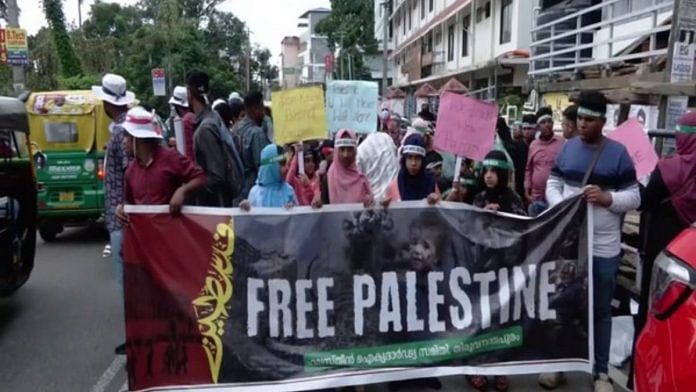As the conflict between Jews and Muslims worsens across the globe, my thoughts inevitably gravitate toward India, where the two communities have, for long, cohabitated without strife. Well, it’s not like there haven’t been Indian Muslims who hold anti-Semitic views or express solidarity with the Palestinian cause. But so far, there have been no direct face-offs between Jews and Muslims in the country. In a world striving for religious and cultural pluralism amid unrest, there’s a unique quality about predominantly Hindu India – the ability of its people to coexist peacefully.
There are no more than 5,000 Bene Israel Jews and a few hundred Baghdadi Jews in the country, while about 85,000 Indian-origin Jews now call Israel their home. The historical interactions between Indian Jews and Indian Muslims often remain overlooked in discussions.
But delving into history, we discover the remarkable tale of Shalom Bapuji Israel, an Indian Jew who, from 1891 to 1896, was the karbhari (prime minister) at Nawab Sidi Ahmed Khan’s court. Khan was an African-origin Muslim ruler presiding over the small Sidi state of Janjira on the Konkan coast. This exceptional official partnership between a Jew and a Muslim is testament to the remarkable unity between the two communities in India.
Also read: As a Pasmanda Muslim, I didn’t grow up hearing about Palestine. We had more pressing issues
Jewish-Muslim unity
India has gifted the world with heart-warming instances of Jewish-Muslim amity, a rarity elsewhere. Through intimate connections, Bene Israel Jews embraced numerous Islamic terms—calling prayers ‘namaz,’ fasts ‘roza,’ their place of worship ‘masjid’ or ‘mashed,’ cemetery ‘kabristan,’ et al. In certain places, they’ve even shared cemeteries, weaving a tapestry of unity and understanding. Some synagogues and Jewish cemeteries in India have dedicated caretakers in the form of Muslims. Take Mohammed Khaleel Khan, a Muslim gentleman who has devotedly served as the caretaker of Kolkata’s Beth El Synagogue for 58 years.
The hallways of two Jewish-run schools in India resonate with the laughter and footsteps of Muslim children, underscoring the beautiful sentiment of coexistence that colours our country’s educational landscape. Khurshid Imam, a devout Muslim, has broken linguistic and cultural barriers to become the only professor of Hebrew in India. Likewise, Thoufeek Zakriya, a Muslim, is the most prominent Hebrew calligrapher in the country, creating art that transcends religious boundaries. In Maharashtra, Muhammad Abdul Yassin delicately preserves the memories of the departed by engraving Jewish tombstones.
And who could overlook the captivating love story of an Indian Muslim gentleman and a Jewish lady, a tale that played a pivotal role in shaping India’s largest pharmaceutical company, Cipla? This remarkable narrative unfolded when Khwaja Abdul Hamied, an Indian Muslim, and Luba Derczanska, a European Jew, joined hands in matrimony.
In a compelling address at the Inter-Religious Seminar in Delhi on 18 October 1971, Hamied expressed his view that “an ideal man must be a good man by virtue of his actions in society (and) may belong to any religion so long as he follows the tenets of his religion.” He ardently advocated for collaboration between Jews and Muslims, drawing inspiration from the historical harmony between the two communities in Islamic Spain.
India is a shining example of unity in diversity. Here, followers of every religion not only coexist but engage in a profound exchange of values. It is here that an African Muslim became king, and a Jew, his prime minister.
But a perplexing question arises despite the rich heritage and intertwined history of both communities: why are we witnessing a shift in the attitudes of some Indian Muslims? They are actively taking an anti-Jewish stance and aligning themselves with Arab Muslims in the Israel-Palestine conflict. Taking sides in a conflict is a natural occurrence, and it’s not entirely unjust to stand in solidarity with Palestinian civilians who deserve support and empathy. But it is concerning that a Hamas leader could conduct a virtual rally in Kerala. It adds an alarming layer to this evolving dynamic.
It’s crucial for India, as well as its Muslim community, to tread carefully. They must watch out for external influences that can potentially radicalise Indian Muslims against Jews. We must safeguard the beautiful religious heritage of India and continue to live together harmoniously.
Amana Begam Ansari is a columnist and TV news panelist. She runs a weekly YouTube show called ‘India This Week by Amana and Khalid’. She tweets @Amana_Ansari. Views are personal.
(Edited by Zoya Bhatti)



